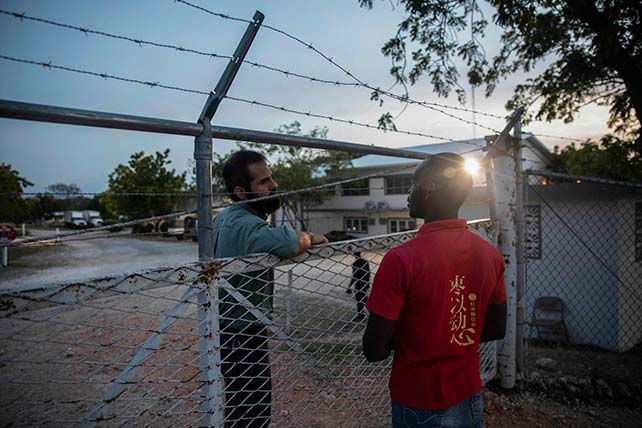As of August, CWS decided to operate its remaining programs in Haiti with only local staff — agriculture and food security programs in the northwest, housing construction and social support for children in the southwest.
Morse worked in the country after a devastating earthquake in 2011 and recalls that many Haitians found resilience in their belief in God.
It’s different now.
“I’m hearing people saying they’ve lost hope,” he said. “People who used to be quick to turn to their faith — we’re hearing less of that.”
Patrick Nelson, a Haitian who is CWS’s top representative in the country, said children and students “want to be in school and studying right now, taking courses, but schools and universities are closed.”
However, he said people are discouraged but not despairing.
“If people didn’t have faith in God or hope that things could be different in Haiti, they wouldn’t be in the streets demanding change,” Nelson said via email.
One of CWS’s members is the Church of the Brethren, which has offered programs for more than 20 years in Haiti and has 30 congregations there. It had a main base in Croix-des-Bouquets, near Port-au-Prince, but the area has been an epicenter of gang activity, according to Jeffrey Boshart, manager of the church’s Global Food Initiative.
RELATED: Christian Aid Ministries Clings to Faith as US Works on Haiti Kidnapping Case
Earlier this year one of the program’s drivers was kidnapped — though later released — and his vehicle stolen, Boshart said, prompting the church to suspend all its activities in the Port-au-Prince region. The remaining programs, involving agriculture, drinking water and home construction, are mostly in rural areas far from the capital and staffed entirely by Haitians, he added.
Boshart said the church also has sharply curtailed a mobile medical clinic program because several of the Haitian doctors who participated have fled to the U.S.
Catholic Relief Services has more than 200 staff members in the country, almost all of them Haitian, but they’ve largely been working remotely. Many of their educational and health care outreaches are on hold.
“Roads are blocked, and they can’t get on the road to go to the office,” said Akim Kikonda, the CRS country representative. “There is no gas to drive their cars, and in some cases there is no internet at the office.”
He added: “You can imagine our frustration … when we see the needs are greater than they have ever been, but we are unable to go meet those needs.”
He hopes that international supporters will rally behind Haiti.
“Haiti has been close to the edge so many times and has always been able to come back,” Kikonda said. “This time I’m seeing a very difficult and challenging situation, hoping there is a light, but personally I can’t see it yet.”
Living Waters for the World, a U.S.-based nonprofit providing clean water systems to numerous countries, has managed to continue its work in Haiti because much of it is done by Haitians, said Bob McCoy, moderator of its Haiti Network Coordinating Team.
International visits continue, though planned carefully.
“The kidnapping was a very unfortunate situation,” McCoy said. “Do we worry about it? You bet. We try to stay smart about what we’re doing. It doesn’t stop our going.”
Meanwhile a new book published by CAM gives its official account of the kidnapping and includes interviews with the hostages, their families and CAM officials.
“Kidnapped in Haiti,” written by Katrina Hoover Lee, reveals that while CAM had a longstanding no-ransom policy, board members were not as committed to it as they thought in the face of an actual crisis.

